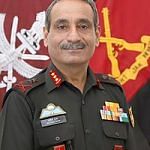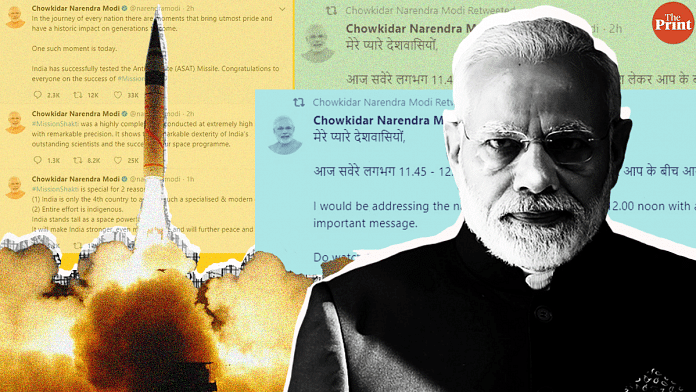India Wednesday successfully test-fired an anti-satellite missile, becoming the fourth country after the US, Russia and China to possess such capability. PM Narendra Modi, in a nationwide address, termed the ability to shoot down satellites in space as ‘Mission Shakti’.
ThePrint asks: A-SAT missile: Is India focusing on ‘Star Wars’ instead of modernising its creaking military?
Neighbours will know India is capable of defending itself in all domains of warfare — land, sea, air & space
 Avinash Chander
Avinash Chander
Director general, DRDO
It has become very important today to be able to create assets in the space and also have the ability to simultaneously defend them. This accomplishment shows that we can defend our assets in space from anyone who potentially tries to attack them. This is a milestone.
It signifies two things: India is capable of identifying a satellite threat and is also capable of intercepting it. This can be understood to mean that India is also capable of intercepting long-range missiles outside the atmosphere. This is a major advancement to India’s defence capability.
Today, communication and satellites are playing a major role in warfare — not only in decision-making but also firing the actual weapons. So, it is extremely important that we are able to protect these satellites and counter any threat by reducing enemy’s capabilities.
Given the scenario, the ability to defend our assets as well as counter long-range missiles interception that we have achieved today is a huge accomplishment for the entire scientific team that worked towards it.
Development of a society and its economy can happen only in a safe and secure environment. We have to make sure we convey to our neighbours that we are capable of defending ourselves in all four domains of warfare — land, sea, air and space.
Besides causing damage to the space environment, such A-SATs don’t benefit all countries
 Upasana Dasgupta
Upasana Dasgupta
Researcher at Institute of Air and Space Law, McGill University
Outer space is to be used for the benefit of all countries, according to the Outer Space Treaty, one of the treaties that lays down the foundational principle of space law and of which India is a party.
Despite all the points made about the A-SAT test being important for India’s defence, this is perhaps a step towards militarisation of space by India. This is really saddening as India’s space programme was essentially started to help its population and not to join the space race. Besides causing damage to the space environment, such ASATs will not result in the benefit of all countries.
This is, of course, the modernisation of military, but a line should be drawn between what is legal and what is wrong internationally. So, while enhancing the military is a great initiative, India should not forget its international obligations.
Additionally, this explosion would have created debris that would float around in space and put other spacecraft at risk, including international ones, although the debris will eventually burn on re-entry into Earth’s atmosphere. Since a nation retains ‘jurisdiction and control’ over space objects in its registry, a space object can be said to be the extension of a nation’s territory, and hence cannot be used for harming other states.
If these space objects collide with an operational space object — or worse with a crewed space object — India’s liability and responsibility may be invoked internationally, which will cause damages worth millions of dollars.
Also read: These futuristic Chinese space denial weapons can disable or destroy opposing satellites
To shed the tag of ‘soft state’ and use tough actions when required, we have to modernise and empower the military
 Lt Gen Satish Dua (Retd)
Lt Gen Satish Dua (Retd)
Former chief of Integrated Defence Staff, Indian Army
India has to be fully equipped for war — whether it is sub-surface, surface, air or space warfare. Space pervades all warfare as it enables intelligence and surveillance, information warfare, cyber domain etc.
Focusing on potential wars and building our capabilities don’t have to be at the expense of modernising our military weaponry – both go hand in hand. For instance, there may be a section of Leftists who suggest that just because poverty is rampant in India, we shouldn’t be spending money on space programmes. But it doesn’t work like that.
While we have to modernise our armed forces, we cannot forget that satellites also play a major role in that modernisation. Satellites are required for intelligence and information warfare. If any enemy country is mobilising its army against India, we will get that information only through satellites. Whether it is cyber warfare or air conflict — a lot is riding on satellites. If we want to shed the soft state tag and use tough options when required, we have to modernise and empower the military.
India becoming the fourth country to have the A-SAT capability is part of the modernisation process. Tomorrow, if we have a conflict with a neighbouring nation, that country will think twice before attacking our satellites. Hence, our latest achievement provides us with a deterrence capability that we did not possess earlier.
A-SAT missile test helps cause of techno-nationalism and is a huge morale booster for India
 Dinesh Kumar Yadavendra
Dinesh Kumar Yadavendra
Distinguished Fellow at CENJOWS, former scientific advisor at HQ Integrated Defence Staff
I have been a long-term advocate of controlled A-SAT technology. It is important to remember that this was controlled, which means that we knew what would happen to the remnants of the explosion. All of the debris in space right now would come down over the next few weeks and burn up in the atmosphere safely.
It is imperative for an advanced country like India to possess this tech, especially during the recent times of increased space activity. It is possible that a satellite, either our own or someone else’s, might deorbit rapidly and disintegrate over us at some point, posing a major risk to life and property in our country, requiring us to shoot it down for our own safety. As ISRO plans to launch a satellite each month, this becomes a necessity for us and forms a safety requirement today.
With regards to the military, launching microsats on demand would become necessary in times of war to observe moving troops. China has realised this technology, and it would again be important for us to be equipped to combat it. I wouldn’t call this Star Wars; it is a necessity.
Of course, this helps the cause of techno-nationalism, and is a huge morale booster for the country.
Modi govt will extol virtues of national security while ignoring a crucial component: economic security
 Bhumish Khudkhudia
Bhumish Khudkhudia
Public policy professional
Notwithstanding its timing, the Modi government and DRDO deserve full credit for approving and successfully executing Mission Shakti, respectively. Developing retaliatory capabilities in the form of an anti-satellite weapon technology and significantly boosting the credibility of India’s missile defence capabilities are remarkable achievements. Interestingly, former defence minister Manohar Parrikar had refused to divulge any further information about the development of anti-satellite weapon technology, citing the interest of national security in a written reply to the Parliament in December 2015.
With the anti-satellite (A-SAT) missile test Wednesday, the government conveyed a message to China – which is a formidable geopolitical force after the US – about India’s ability to develop counter-space capabilities to protect the country’s critical space assets from any form of external threats. China’s first anti-satellite test in 2007 drew international condemnation. It remains to be seen how the international community responds to India’s anti-satellite missile test and comparisons with China’s anti-satellite test in terms of spawning space debris is inevitable.
Nevertheless, the ruling party framing the debate and conversations on national security in very narrow terms for electoral gains is deeply problematic. The government will definitely extol virtues of national security through the prism of Balakot airstrikes and now the successful execution of Mission Shakti, conveniently overlooking the fact that economic security, especially in the form of enabling gainful employment for millions of youth, is a very crucial component of national security.
Hence, the argument about India focusing on Star Wars instead of augmenting defence modernisation in the current context is misplaced.
By Sandhya Ramesh and Fatima Khan.




The show casing of our space technology is okay, but what about project Kaveri? The project to design engines for Tejas fighter planes stands abolished. There is a dire need to design, develop and make our own fighter jets and reduce our dependence on imports. Successive governments have neglected this area. We may be well prepared to fight space wars of the future, but what about battles of today that could not be fought well, as we have aged , time barred fighter planes?
The capabilities to knock out a satellite in low earth orbit overlap those required to perform the more difficult task of neutralising an incoming ballistic missile. So. today’s test may not have cost muchin terms of financial outlay. Some experts believe all countries should adhere to the spirit of the 1967 Treaty that bans the militarisation of outer space. The timing of the test, amidst high noon of the general election, has given rise to a political debate. On both defence and foreign policy, such discord was rare in the past.
Lest I be accused of plagiarism, posted my comment before watching Cut the Clutter …